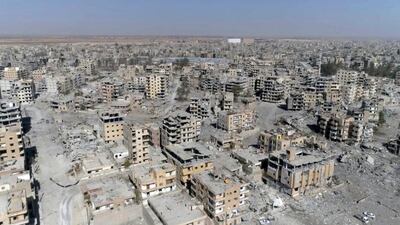Airstrikes carried out by the US-led coalition to defeat ISIS have killed more than 3,000 civilians in Syria, according to a monitoring group.
In the four years since the coalition began its bombing campaign against the extremist group there, the Syrian Observatory for Human Rights said strikes have killed 3,331 civilians.
Among that number were 826 children and 615 women, the Britain-based group said.
That number is significantly higher than the one given by the coalition, which has admitted to unintentionally causing the death of 1,061 civilians in both Iraq and Syria.
“With the death of more than 3330 civilians, including about 1450 children and women, we strongly condemn targeting civilians anywhere and under any pretext and at any time by the international coalition,” the Observatory said.
ISIS swept across Syria and Iraq in 2014, capturing large swathes of territory in a lightning offensive that caught the international community by surprise. It took control of major cities in both countries, including Mosul and Raqqa, ruling over 10 million people at its peak.
In August of that year, ISIS fighters overran the town of Sinjar and threatened a genocide of the Yazidi people. The United States launched began an air campaign to stop that happening, and the next month widened it to include targets in Syria.
Since then, ISIS has been reduced to only a few pockets of territory in Syria, and is reverting back to an insurgency that operates underground.
But while the campaign to recapture territory from ISIS has been largely successful, it has come at a great cost for civilians. The fight to recapture urban areas under ISIS control involved carrying out airstrikes in densely populated urban areas.
Airwars, an independent investigative group that tracks civilian casualties, estimates the number to be even higher. It said at least 4,300 civilians have likely been killed by the international coalition in Syria.
"One reason for that gulf between military and public estimates is that the coalition is yet to investigate hundreds of reported cases forwarded to them by Airwars and other organisations," Abdulwahab Tahhan, Syria researcher at Airwars, told The National.
“The gap also points to systemic failings in how modern militaries fighting remote wars count the dead below," he added.
____________
Read more:
US-led coalition strikes kill more than 40 civilians in Raqqa
Syrian civilian deaths from Russian air strikes hit record levels in March, monitor says
UK admits to first civilian death in fight against ISIS
____________
Responding to the Syrian Observatory report on Monday, coalition spokesman Colonel Sean Ryan said: “Any civilian death is a tragedy and coalition makes every effort to avoid civilian deaths in the battlefield, and to minimise the impact of our operations on civilian populations and infrastructures.”
Commenting on the discrepancy between independent monitors and the coalition’s own figures, Col Ryan said: “The coalition is not claiming to provide exact numbers, but saying it is based on the best available evidence, and we are acknowledging ‘at least’ a certain number of civilian casualties caused by coalition strikes.”
He added: “The coalition has been clear we are willing to work with anyone on allegations, and we will re-open and re-assess past cases based on new or compelling evidence.”
The battle for Raqqa, which ISIS named as the capital of its caliphate, was one of the most ferocious of the campaign. An estimated 2,000 civilians were killed in the fight, in which Kurdish-led forces relied heavily on US airpower. The coalition, including its Kurdish partners on the ground, fired more than 20,000 munitions – from airstrikes to rockets and artillery shells – into Raqqa leaving the city largely destroyed.
In a report released in June into the Raqqa campaign, Amnesty International said an investigation had revealed “prima facie evidence that several coalition attacks which killed and injured civilians violated international humanitarian law.”
It added that, although ISIS “exacerbated the challenges inherent to urban combat by operating amongst civilians and using them as human shields, their tactics were known well ahead of the Raqqa campaign. Coalition forces did not take adequate account of civilians present in the city and failed to take the precautions necessary to minimise harm to civilians and civilian objects.”
Amnesty also criticised the coalition’s reporting of its strikes in Raqqa and Mosul as “woefully inadequate” for not providing accurate strike locations, which means they cannot be properly investigated.

